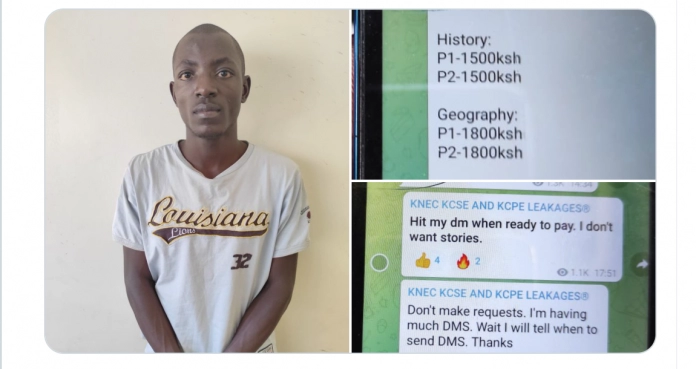He pleaded not guilty to two charges before Chief Magistrate Wendy Kagendo.
Brighton further denied that he was found with national examination papers illegally obtained from an unknown location in Kenya on various dates between March 7 and 10, 2022.
He was also charged charged with a second count of disclosing the contents of the exams to another person via his mobile phone.
He was released on a Ksh1 million bond.
The Zetech university student of Economics was apprehended by the Undercover sleuths from the Kenya National Examination Council’s (KNEC) monitoring and surveillance unit in early March.
According to DCI, the suspect had created everal WhatsApp groups where unsuspecting candidates were duped to deposit between Ksh1,600 for Humanities to Ksh2,600 for Sciences.
“He had created several WhatsApp groups where candidates were asked to deposit between Ksh1,600 for Humanities to Ksh2,600 for Sciences,” noted the DCI.
This comes barely a day after, DCI revealed that it had arrested four suspects responsible for high level examination fraud, following intelligence reports of sale of examination papers to candidates sitting the ongoing Kenya Certificate of Secondary Schools Examinations (KCSE).
Yesterday also the Education CS George Magoha dismissed claims that Kenya Certificate of Secondary Education (KCSE) examination papers had leaked.
CS Magoha, stated that a joint team of DCI investigators and Ministry of Education officials busted an early-exposure ring that was assisting students in cheating on their exams.
“A few scrupulous people have over the last five years devised a new dirty trick of opening examination packages a few minutes before the start time, in what we call the “early exposure”.” CS Magoha said.
According to the CS, the cartels in question were using mobile phones to photograph the exam before sneaking out the questions and passing them on to a hired group, who would then tackle the questions and send the answers back to the examination center.
To further minimise incidences of malpractice, the Education Ministry has issued a slew of new directives aimed at closing all potential exam leakage loopholes.


